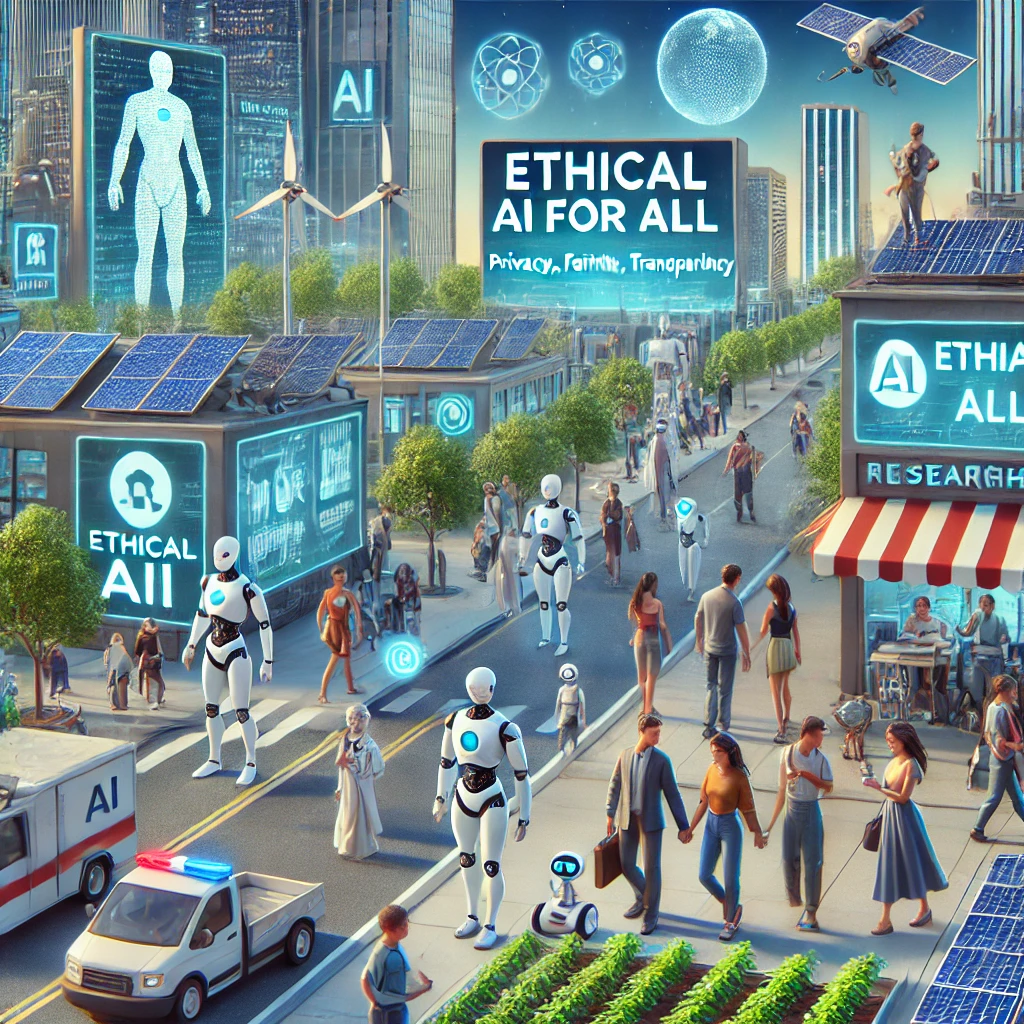Your cart is currently empty!

Ethical Technology: Navigating the Digital Age with Responsibility, Jobs in Ethical Technology
The rapid advancement of technology has reshaped our world, revolutionizing industries, economies, and societies. However, with these developments come ethical dilemmas that challenge businesses, governments, and individuals. Ethical technology is no longer an option; it is a necessity. From data privacy concerns to AI bias, ensuring ethical tech practices is crucial in fostering a fair…
The rapid advancement of technology has reshaped our world, revolutionizing industries, economies, and societies. However, with these developments come ethical dilemmas that challenge businesses, governments, and individuals. Ethical technology is no longer an option; it is a necessity. From data privacy concerns to AI bias, ensuring ethical tech practices is crucial in fostering a fair and just digital ecosystem. This article delves into various aspects of technology and ethics, highlighting ethical issues in technology, the role of ethical companies, and career opportunities in ethical tech jobs.
Table of Contents
The Importance of Ethical Technology
Ethical technology refers to the responsible development, deployment, and use of technology while considering social, moral, and legal implications. As digital transformation accelerates, ethical technology issues such as data privacy, AI bias, and misinformation have gained prominence. Companies that prioritize ethics in tech create products and services that benefit society rather than exploit vulnerabilities.
Ethical Issues in Technology
- Data Privacy and Security
- With the increasing amount of personal data collected by tech companies, concerns about data security and privacy breaches have become critical ethical issues in tech. Companies like Facebook and Google have faced scrutiny for mishandling user data, emphasizing the need for stricter regulations and ethical technology use.
- Artificial Intelligence and Bias
- AI has the power to automate decision-making, but it is susceptible to bias. Ethical problems in technology arise when AI models discriminate against specific groups due to biased training data. Addressing these concerns requires transparent AI ethics jobs that focus on fairness and accountability. Thus ethical AI is a need of the moment.
- Automation and Job Displacement
- The rise of automation threatens traditional employment, making it essential to create ethical jobs that balance efficiency and social responsibility. Ethical tech jobs should focus on retraining and reskilling workers affected by technological advancements.
- Misinformation and Fake News
- The spread of misinformation on digital platforms has profound consequences. Companies must take responsibility for curbing the dissemination of false information through fact-checking and responsible content moderation.
- Surveillance and Digital Rights
- Governments and corporations increasingly use technology for surveillance, raising ethical concerns about individual freedoms. Ethical organisations advocate for digital rights, ensuring that technology is used responsibly.
Ethical Tech Companies Leading the Way
Businesses that prioritize ethics in technology set an example for the industry. Ethical organizations uphold principles of transparency, sustainability, and social responsibility. Some of the most ethical tech companies include:
- Microsoft: Committed to responsible AI and sustainability.
- IBM: Promotes AI ethics and privacy-first computing.
- Salesforce: Focuses on ethical AI and corporate social responsibility.
- Patagonia: Though not a tech giant, it leads in ethical business practices, inspiring tech firms to follow suit.

Characteristics of Ethical Businesses in Technology
Ethical businesses follow specific principles to ensure technology ethics are upheld:
- Transparency: Clear policies on data collection, AI decision-making, and cybersecurity.
- Accountability: Mechanisms to address ethical issues and ensure compliance with regulations.
- Inclusivity: Diverse teams to mitigate biases in technology development.
- Sustainability: Green computing and eco-friendly initiatives to reduce environmental impact.
- Consumer Protection: Prioritizing user privacy and rights in digital services.
Ethical Technology Companies and Their Contributions
Several ethical technology companies focus on creating responsible solutions, including:
- DuckDuckGo: A privacy-focused search engine.
- Ecosia: A search engine that uses profits for reforestation.
- Mozilla: Advocates for internet privacy and open-source innovation.
Careers in Ethical Tech
As awareness of ethics in tech grows, so do job opportunities in responsible technology fields. Ethical tech jobs involve ensuring that technology aligns with societal values and ethical principles.
High-Demand Tech Jobs for Good
- AI Ethicist Jobs: Professionals who ensure AI systems are fair and unbiased.
- Tech Ethicist Jobs: Experts who evaluate the ethical impact of emerging technologies.
- Cybersecurity Analysts: Protecting user data and preventing cyber threats.
- Data Privacy Officers: Ensuring compliance with data protection regulations.
- Responsible Tech Job Board Managers: Connecting professionals with ethical companies.
- Technology Ethics Jobs in Policy: Shaping regulations for ethical technology use.
How to Find Ethical Technology Jobs
- Networking with Ethical Organizations: Engaging with companies that prioritize ethics in technology.
- Using Job Portals Focused on Ethical Work: Searching for responsible tech job boards.
- Gaining Relevant Certifications: Enrolling in courses on AI ethics, cybersecurity, and data privacy.
Tech Jobs for Good: Making a Difference
Many professionals seek tech for good jobs that align with their values. Whether working on climate-friendly technologies or developing accessible software for marginalized communities, ethical tech jobs offer a chance to contribute positively to society.
Ethical Issues in Tech: Addressing Challenges
Technology ethical issues persist, but proactive solutions can help address them. Some approaches include:
- Regulatory Frameworks: Governments must implement laws that enforce ethical technology standards.
- Corporate Social Responsibility (CSR): Ethical businesses must integrate social responsibility into their operations.
- Consumer Awareness: Educating users on technology ethics and their rights.
- Collaboration: Tech firms, policymakers, and NGOs must work together to solve ethical problems with technology.
Technologies with Ethical Issues and Possible Resolutions
| Technology | Ethical Concern | Solution |
|---|---|---|
| AI | Bias in decision-making | Implement fairness algorithms |
| Facial Recognition | Privacy invasion | Strict regulations and opt-in policies |
| Social Media | Misinformation | Improved fact-checking and AI moderation |
| Big Data | Exploitative data collection | User control over data sharing |
The Future of Ethics in Technology
As technology continues to evolve, ethical considerations will become even more critical. Ethical issues in technology will shape regulations, corporate policies, and consumer expectations. Companies that are ethical will thrive in a landscape where trust and transparency are valued more than ever.
Steps Toward a More Ethical Tech Industry
- Embedding Ethics in Tech Education: Universities must integrate ethics into STEM curricula.
- Encouraging Ethical Leadership: Business leaders must advocate for ethical technology use.
- Advancing Ethical Technologies: Innovation should align with societal well-being.
- Supporting Ethical Tech Jobs: Growing demand for ethics-focused tech roles highlights the importance of moral responsibility in technology development.
Take Away
Ethics in technology is an evolving field that demands vigilance, accountability, and proactive engagement from individuals, businesses, and policymakers. Ethical technology issues will continue to emerge, but by prioritizing ethics in tech, we can create a more just and responsible digital world. Whether through ethical businesses, tech jobs for good, or responsible AI, the future of technology ethics depends on collective action and a commitment to doing what is right. By choosing ethically good companies, advocating for responsible innovation, and pursuing careers in ethical technology, we can ensure that technology serves humanity rather than exploits it.
FAQs
What is ethical technology?
Ethical technology refers to designing, developing, and deploying technology that prioritizes fairness, transparency, accountability, and societal well-being. It ensures that technological advancements do not cause harm and are aligned with human values, promoting inclusivity, sustainability, and responsible innovation.
Why is ethics in tech important?
Ethics in technology is crucial because it helps prevent harm, protect privacy, ensure fairness, and promote social responsibility. Without ethical considerations, technology can lead to unintended negative consequences such as discrimination, privacy violations, and misinformation. Ethical practices ensure that technology benefits society rather than exacerbating existing inequalities or introducing new risks.
What are some ethical issues in technology?
Some common ethical issues in technology include:
Data privacy violations – Companies collecting and misusing personal data.
AI bias – Discriminatory algorithms that unfairly impact certain groups.
Misinformation – The spread of false or misleading information through digital platforms.
Automation-related job displacement – The loss of jobs due to AI and robotics replacing human labor.
Surveillance and privacy concerns – The misuse of technology for mass surveillance.
Environmental impact – E-waste and energy consumption from data centers.
What is the role of government in technology ethics?
Governments play a critical role in regulating technology by:
Enforcing privacy laws such as GDPR (Europe) and CCPA (California).
Promoting fair competition through antitrust regulations to prevent monopolies.
Encouraging ethical AI development by setting guidelines for responsible AI use.
Holding companies accountable for unethical practices like data breaches and misinformation.
How do companies ensure ethical technology use?
Companies promote ethical technology use through:
Transparency – Clearly communicating how technology works and how data is used.
Ethical AI practices – Conducting fairness audits and avoiding biased datasets.
Regulatory compliance – Adhering to laws such as GDPR and CCPA to protect user rights.
Corporate social responsibility (CSR) – Investing in sustainability and community initiatives.
Internal governance frameworks – Establishing ethics committees to review technology policies.
What are the most ethical tech companies?
Some companies recognized for their ethical technology practices include:
Microsoft – Strong AI ethics policies and commitment to accessibility.
IBM – Ethical AI initiatives and responsible AI research.
Salesforce – Focus on sustainability and social responsibility.
DuckDuckGo – Privacy-focused search engine that does not track users.
Mozilla – Open-source software and privacy-centric web policies.
Ecosia – A search engine that donates ad revenue to tree-planting initiatives.
How does AI bias affect ethics in technology?
AI bias occurs when machine learning algorithms reflect or amplify existing societal biases, leading to unfair or discriminatory outcomes. For example:
Hiring algorithms may favor certain demographics over others.
Facial recognition may be less accurate for people with darker skin tones.
Loan approval systems may disadvantage minority communities.
To mitigate AI bias, companies must use diverse training datasets, conduct bias audits, and ensure ethical AI governance.
How can individuals promote ethical tech practices?
Individuals can contribute to ethical technology by:
Advocating for digital rights and supporting legislation that protects user privacy.
Using ethical tech products like privacy-focused browsers and search engines.
Being mindful of data sharing and reviewing privacy policies before using apps.
Supporting companies with ethical practices by choosing responsible brands.
Educating others on the importance of ethics in technology.


